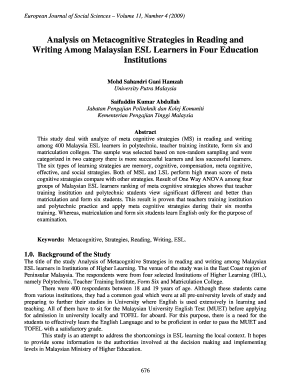
Get Analysis On Metacognitive Strategies In Reading And Writing Among Malaysian Esl Learners In Four
How it works
-
Open form follow the instructions
-
Easily sign the form with your finger
-
Send filled & signed form or save
How to fill out the Analysis on Metacognitive Strategies in Reading and Writing Among Malaysian ESL Learners in Four online
This guide provides a user-friendly approach to completing the Analysis on Metacognitive Strategies in Reading and Writing Among Malaysian ESL Learners in Four document online. Follow the steps outlined to ensure accurate and effective completion of the form.
Follow the steps to successfully complete the form online.
- Press the ‘Get Form’ button to access the form and open it in your editor.
- Begin filling out the form by entering the required personal information in the designated fields. Ensure that all data is accurate and up-to-date.
- In the background of the study section, summarize the context of the research as it pertains to metacognitive strategies among Malaysian ESL learners. Be concise yet informative.
- For the statements of the problem, outline the key issues faced by Malaysian ESL learners regarding their English language acquisition and the lack of effective learning strategies.
- In the objectives section, clearly list the goals of the study, such as comparing metacognitive strategies between more successful learners and less successful learners.
- Fill in the concept of metacognitive strategies by explaining its significance and impact on reading and writing processes for ESL learners.
- Complete the methodology section by detailing the study participants, selection criteria, and data analysis methods used in the research.
- Once you have filled out all sections of the form, review all entries for accuracy and completeness.
- Finally, save the changes, and download, print, or share the completed form as needed.
Complete the document online today for a comprehensive understanding of metacognitive strategies in ESL learning.
Metacognitive strategies in reading involve techniques that help students become more aware of their comprehension and processing of texts. The analysis on metacognitive strategies in reading and writing among Malaysian ESL learners in four highlights strategies like summarizing, questioning, and predicting. These techniques encourage learners to think critically about their reading material. By employing these strategies, students improve not only their reading comprehension but also their overall writing skills.
Industry-leading security and compliance
-
In businnes since 199725+ years providing professional legal documents.
-
Accredited businessGuarantees that a business meets BBB accreditation standards in the US and Canada.
-
Secured by BraintreeValidated Level 1 PCI DSS compliant payment gateway that accepts most major credit and debit card brands from across the globe.


